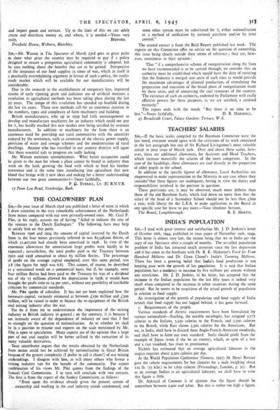SIR ' —Mr. Watson in The Spectator of March 23rd goes
to great pains ...to show what price the country may be required to pay if a policy designed to ensure a prosperous agricultural community is adopted, but he says nothing about the benefits that are to be gained. Irrespective of the insurance of our food supplies in times of war, which in itself is a practicallyoverwAdming argument in favour of sych a policy, the ready- made market which will be available for our manufacturers will be considerable.
Due to the research in the establishment of temporary leys, improved strains of early ripening grain and judicious use of artificial manures a revolution in agricultural methods has been taking place during the last 20 years. The tempo of this revolution has speeded up fourfold during the last six years. These new methods call for an enormous increase in the numbers, types and complexity of farm machinery and building.
British manufacturers, who up to 1939 had little encouragement to develop and manufacture machinery for an industry which could not pay for it, has hardly touched this new market now being satisfied by overseas Manufacturers. In addition to machinery for the farm there is an enormous need for providing our rural communities with the amenities enjoyed by the townsmen, such as extension of the electric power supply, provision- of water and sewage schemes and the modernisation of rural dwellings. Anyone who has travelled in our country, districts will agree that these essential aids to progress are sadly lacking.
Mr. Watson mentions unemployment. What better occupation could be given to the man for whom a place cannot be found in industry than work on the land, growing the food with which to feed his brother townsman and at the same time introducing into agriculture that new blood that brings with it new ideas and making for a better understanding between our two great communities?—Yours faithfully,


























 Previous page
Previous page